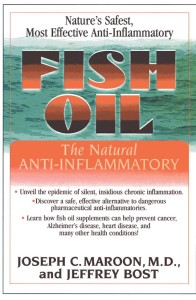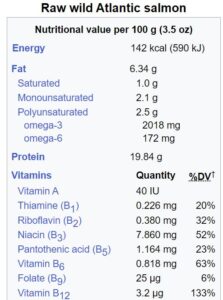Omega-3 Fish Oil Supplements- A Common Sense Approach to Heart Health

Dr. Maroon – Fish Oil Book
March 2023 – Having written two books and lecture extensively on the health benefits of omega-3 fatty acids found in fish oil, I still find more to learn about these complex molecules. Some of the most recent studies on the use of omega-3s have received widespread media reports because they didn’t “cure” or stop a disease process. The NIH website, entitle, Omega-3 Supplements: In Depth – What’s the Bottom Line?, sums up the ambiguous and confusing natural of the conflicting results reported investigating omega-3’s for heart health.
Per the NIH
“What do we know about the effectiveness of omega-3 supplements?
- Research indicates that omega-3 supplements don’t reduce the risk of heart disease.
- However, people who eat seafood one to four times a week are less likely to die of heart disease.
- High doses of omega-3s can reduce levels of triglycerides.”
So lets look at each statement. In the first statement they comment on studies that investigated the use of omega-3 supplements to reduce the risk of heart disease. The fact is there are hundreds or more studies that have reported that omega-3 consumed as supplement have reduced the risk of heart disease. But in the option of the NIH the studies that didn’t show risk reduction were “more scientific” and therefore more accurate than those that did show risk reduction. This “more scientific” opinion is certainly arbitrary and not shared by all scientists.
Study Design
The issues that make this even more confusing is how the studies on omega-3 and heart health were designed. For example, were they done with a survey questionnaire asking how much fish oil the subject took or were they done by testing blood levels of omega-3 to determine that, in fact, the subject was taking fish oil and their blood level reflected this. Also, if they did test blood levels for omega-3 did they find any subjects that had significantly higher level of omega-3 that is more likely to have a heart benefit from taking omega-3? Additionally, did the subject already have underlying heart disease at the start of the study, or did the study last long enough to see a benefit from taking an omega-3 are are questions not answered by NIH’s statement.
 NIH Reverses their Position in Statement 2
NIH Reverses their Position in Statement 2
To make the NIH’s position even worse, in statement (2) it seems to reverse the first statement that omega-3 doesn’t provide a heart benefit. In statement (2) they report people that eat seafood 1 to 4 times per week are less likely to die of heart disease. Lets take salmon as an example. There are about 2 gms or 2,000 mgs of omega-3 in a 8oz. serving of salmon. Based on this NIH statement you can consume between 2 to 8 gms of omega-3 from fish per week and lower your risk of death from heart disease. For all my patients I recommend at least 2 gms of omega-3 as a dietary supplement per day or 14 gms/week. Why wouldn’t more fish oil consumed as a supplement, having the exact molecular structure, since it made from FISH, impart a similar heart benefit?
Perhaps there is something other that omega-3 that is benefiting heart health? Whole seafood is a wide range of different sources. But let’s take salmon as an example of a common fish known to have higher levels of omega-3. (See image of RDA for salmon). Salmon as you can see in this USDA summary has multiple other vitamins, proteins, and other polyunsaturated fats. What are not listed are the many toxins and heavy metals, like mercury and lead found in fish. In fact, per the FDA, pregnant or breast feeding women are restricted to “consume between 8 and 12 ounces per week of a variety of seafood from choices that are lower in mercury.”
Fish oil supplement of higher quality, like Omax3(TM), performs multiple tests on its fish oil insure that it is toxin free. Cooking or frying fish at high temperature can actually remove or breakdown the omega-3 molecule to lower the overall amount consumed. In conclusion, statement (2), in my opinion, is in fact true, not only for seafood but also high dose omega-3 supplements can provide significant heart health benefits.
Triglycerides – FACTS
Finally, statement (3), is a fact based on blood lab values that can not be associated with interpretation. FACT – High doses of omega-3s can reduce levels of triglycerides. High doses of omega-3 can only be obtained safely by using high dose omega-3 dietary supplements. On another NIH website they state – high triglycerides in your blood can raise your risk of heart disease and stroke. A NIH study reported in 2020, stated. ” the prevalence of Americans with triglyceride levels ≥ 150 mg/dl was 25.9%, representing 56.9 million.
My conclusion has and will remain, based on current research, that omega-3 dietary supplements are part of a healthy diet and lifestyle design to prolong health and prevent disease, including heart disease. Reading news headlines are often confusing and many are full of unnecessary hype. Americans remain near the bottom of all countries when it come to disease prevention, education and spending. Don’t be confused, Omega-3 are part of the solution!




 Dr. Maroon received an athletic scholarship to Indiana University in Bloomington, Indiana where as an undergraduate, he was named a Scholastic All-American in football. Dr. Maroon has successfully maintained his personal athletic interests through participation in 9 marathons and more than 72 Olympic-distance triathlon events. However, his greatest athletic accomplishment is his participation in 8 Ironman triathlons (Hawaii – 1993, 2003, 2008, 2010, 2013; Canada – 1995; New Zealand – 1997; Germany – 2000), where he usually finishes in the top 10 of his age group. Recently, in July 2012 and 2013, he finished second and third, respectively, in his age group in the Muncie, Indiana half Ironman triathlon. In October 2013 he completed his 5th World Championship Ironman in Kona, Hawaii.
Dr. Maroon received an athletic scholarship to Indiana University in Bloomington, Indiana where as an undergraduate, he was named a Scholastic All-American in football. Dr. Maroon has successfully maintained his personal athletic interests through participation in 9 marathons and more than 72 Olympic-distance triathlon events. However, his greatest athletic accomplishment is his participation in 8 Ironman triathlons (Hawaii – 1993, 2003, 2008, 2010, 2013; Canada – 1995; New Zealand – 1997; Germany – 2000), where he usually finishes in the top 10 of his age group. Recently, in July 2012 and 2013, he finished second and third, respectively, in his age group in the Muncie, Indiana half Ironman triathlon. In October 2013 he completed his 5th World Championship Ironman in Kona, Hawaii.